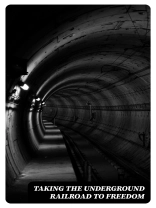Taking the Underground Railroad to Freedom illuminates the profound narratives of resilience and defiance that powered the clandestine escape network during America’s darkest era. This anthology offers a rich tapestry of firsthand accounts and interpretative narratives, weaving together themes of liberation, courage, and the relentless pursuit of justice. The collection is a poignant blend of literary styles, from gripping personal testimonies to insightful observations, each contributing to the larger historical discourse on slavery and emancipation. Noteworthy pieces capture the tension and triumph of those who traversed risky terrains in search of freedom, offering a raw, compelling insight into the era’s human spirit. The anthology draws from the compelling voices of distinguished authors William Still, Laura S. Haviland, and Sarah Bradford, whose combined works create a mosaic of powerful narratives. Their diverse backgrounds—from Still’s firsthand documentation to Haviland’s abolitionist activism and Bradford’s biographical storytelling—provide an enriched perspective on the diverse experiences of those involved in the Underground Railroad. Operating within the larger abolitionist movement, these authors transcend mere documentation, contributing to a pivotal cultural and historical narrative. Readers are invited to explore a pivotal era of American history through this anthology, which offers a unique glimpse into the complexities of the Underground Railroad through various lenses. Its educational significance is underscored by the breadth of insight it provides into human resilience. This volume is a must-read for those eager to understand the multifaceted dialogue of liberation and empathy that persists through these historical chronicles, providing an invaluable resource for scholars and enthusiasts alike.
Circa l’autore
William Still (October 7, 1821 – July 14, 1902) was a distinguished African-American abolitionist, conductor on the Underground Railroad, writer, historian, and civil rights activist. Born in Burlington County, New Jersey, to former slaves, he grew up to become one of the most influential and successful Underground Railroad operators in Philadelphia. Pioneering the meticulous documentation of the fugitive slaves he assisted, Still’s work culminated in the seminal book ‘The Underground Railroad Records’ (1872), detailing the stories and strategies of escapees. More widely recognized by the title ‘Taking the Underground Railroad to Freedom, ‘ his book remains a foundational text in African-American history and antebellum American studies. Still’s detailed accounts not only provide valuable insights into the lives and experiences of those who fled bondage but also serve as a testament to the resilience and courage of both the freedom seekers and those who aided them. His work, characterized by its forthright and powerful prose, captures the urgency of escape and the complexities of the journey that so many faced en route to freedom. As an author, Still’s contributions extend beyond the mere recounting of events; his meticulous records and narratives helped to personalize the struggle against slavery, ensuring that individual stories were preserved for posterity. Still’s literary legacy is characterized by both its historical significance and its emotional resonance, cementing his status as a vital figure in American letters and a champion of human rights.












